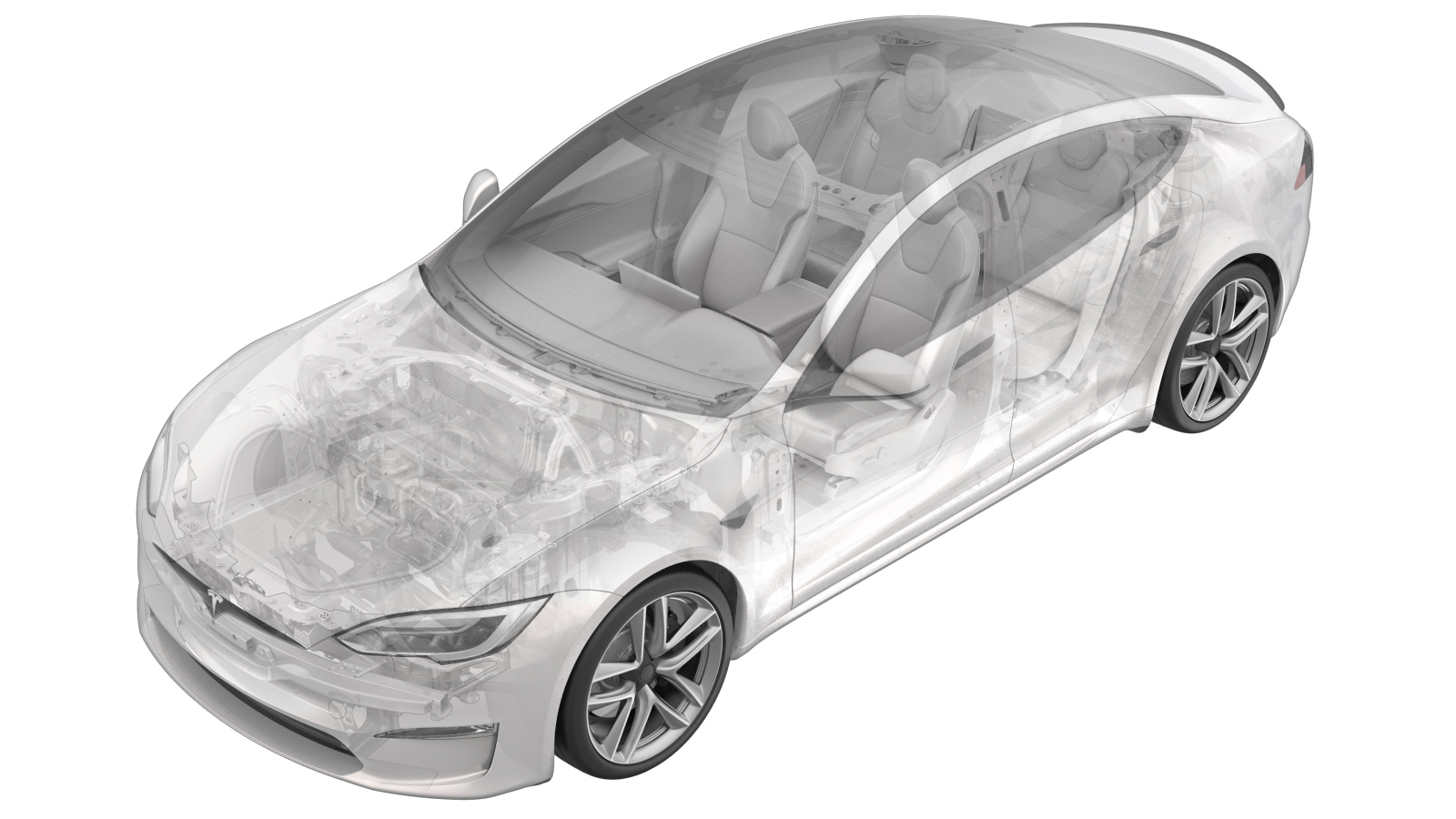Busbars - Charge Port to HV Battery (Global) (Remove and Replace)
 Correction code
44013122
0.78
NOTE: Unless otherwise explicitly
stated in the procedure, the above correction code and FRT reflect all of the work
required to perform this procedure, including the linked procedures. Do not stack correction codes unless
explicitly told to do so.
NOTE: See Flat Rate Times to learn
more about FRTs and how they are created. To provide feedback on FRT values, email ServiceManualFeedback@tesla.com.
NOTE: See Personal Protection to make sure proper PPE is worn when
performing the below
procedure.
Correction code
44013122
0.78
NOTE: Unless otherwise explicitly
stated in the procedure, the above correction code and FRT reflect all of the work
required to perform this procedure, including the linked procedures. Do not stack correction codes unless
explicitly told to do so.
NOTE: See Flat Rate Times to learn
more about FRTs and how they are created. To provide feedback on FRT values, email ServiceManualFeedback@tesla.com.
NOTE: See Personal Protection to make sure proper PPE is worn when
performing the below
procedure.
- 2023-08-25: Added link to charge port voltage check procedure.
- 2023-07-05: Cleaned up procedure.
Remove
- Open all four doors.
- Lower the LH and RH front windows.
- Move the driver and front passenger seats fully forward.
- Open the liftgate.
- Remove the rear trunk parcel shelf. See Parcel Shelf - Rear Trunk (Remove and Replace).
- Remove the rear trunk load floor. See Trunk Load Floor - Rear (Remove and Replace).
- Remove the side trunk load floor. See Trunk Load Floor - Side (Remove and Replace).
- Remove the trunk sill trim. See Trim - Sill - Trunk (Remove and Replace).
- Remove the LH and RH 2nd row seat outer bolsters. See Bolster - Outer - Seat - 2nd Row - LH (Remove and Replace).
- Remove the 2nd row lower seat cushion. See Seat Cushion - Lower - 2nd Row (Remove and Replace).
-
Fold the LH 2nd row 60 seat
down.
NoteSeat can be folded from the backrest button or trunk switch.NoteSince the seat cushion is not present, protect the seat as required.
- Open the charge port door using the vehicle touchscreen.
- Open the hood.
- Remove the rear underhood apron. See Underhood Apron - Rear (Remove and Replace).
- Disconnect LV power. See LV Power (Disconnect and Connect).
- Perform the charge port voltage check procedure. See Charge Port Voltage Check.
- Remove the rear wall rear trunk trim. See Trim - Rear Trunk - Rear Wall (Remove and Replace).
- Remove the LH trunk load floor bracket. See Bracket - Trunk Load Floor - LH (Remove and Replace).
- Remove the trunk floor front trim. See Trim - Front - Floor - Trunk (Remove and Replace).
- Remove the LH lower C-pillar trim. See Trim - C-Pillar - Lower - LH (Remove and Replace).
- Remove the LH mid C-pillar trim. See Trim - C-Pillar - Mid - LH (Remove and Replace).
-
Release the LH upper C-pillar trim,
and then set it aside. See Trim - C-Pillar - Upper - LH (Remove and Replace).
NoteDo not remove the lower bolt that attaches the LH 2nd row seat belt retractor.
- Remove the LH trunk side trim. See Trim - Side - Trunk - LH (Remove and Replace).
-
Disconnect the 60 seat electrical
connector.
-
Release the harness clip for the 60
seat and the rear seat cushion.
-
Disconnect the charge port latch
electrical connector.
NoteTake note of harness routing.NotePull the red locking tab outwards to release the lock, and then pull again to release the electrical connector.
-
Disconnect the charge port electrical
connector.
NoteCarefully remove the white locking tab. Press the tab to release the electrical connector from the charge port. Continue to pull off the connector. The connector is intended to disengage the safety cap when released.
-
Release the hooks (x2) that attach the
charge port safety cap to the charge port, and then remove it from the vehicle.
Note2x hooks
-
Remove the nuts (x2) that attach the
charge port busbars to the charge port, and then remove the busbar leads from the
studs.
 9 Nm (6.6 lbs-ft)TIpUse of the following tool(s) is recommended:
9 Nm (6.6 lbs-ft)TIpUse of the following tool(s) is recommended:- 11 mm socket
NoteNuts have captured washers.NoteTake caution of any tension present with the busbars. - Remove the LH 2nd row cushion support block. See Support Block - 2nd Row Cushion - LH (Remove and Replace).
-
Remove the bolts (x2) that attach the
busbars to the HV header, and then release the busbars.
 9 Nm (6.6 lbs-ft)TIpUse of the following tool(s) is recommended:
9 Nm (6.6 lbs-ft)TIpUse of the following tool(s) is recommended:- 10 mm deep socket
NoteMake sure to set the busbars aside to prevent remating with the pack port. -
Remove the bolt that attaches the
busbar cover access door.
 9 Nm (6.6 lbs-ft)TIpUse of the following tool(s) is recommended:
9 Nm (6.6 lbs-ft)TIpUse of the following tool(s) is recommended:- 10 mm deep socket
NoteUse a small flat screwdriver to release the cover. -
Remove the busbars from the
vehicle.
NoteRecommend assistance.NoteManeuver the busbars rearward, and then remove them through the liftgate. Rotate them to clear the seat bracket.
Install
-
Clean the HV connector contact surface
of residual Penetrox with an Isopropyl Alcohol (IPA) wipe.
NoteAllow 1 minute dry time after removing Penetrox.NoteNew busbars come with Penetrox applied to the HV connector.
-
Clean the charge port assembly busbar
contact surface of residual Penetrox with an IPA wipe.
NoteUse a plastic trim tool to push the IPA wipe down between plastic divider.NoteAllow 1 minute dry time after removing the Penetrox.
-
Verify that the charge port studs (x2)
are tightened to specification.
 2 Nm (1.5 lbs-ft)TIpUse of the following tool(s) is recommended:
2 Nm (1.5 lbs-ft)TIpUse of the following tool(s) is recommended:- Torx T10 bit
-
Install the busbars into the
vehicle.
NoteRecommend assistance.NoteManeuver the busbars forward through the liftgate, and then rotate to clear the seat bracket.
-
Secure the busbars onto the HV header,
and then install bolts (x2).
 9 Nm (6.6 lbs-ft)TIpUse of the following tool(s) is recommended:
9 Nm (6.6 lbs-ft)TIpUse of the following tool(s) is recommended:- 10 mm deep socket
NoteMake sure the busbars are seated flush onto the pack port to prevent arching. -
Apply Penetrox to the backside of the
busbar leads.
NoteApply 2 drops of Penetrox A-13 about 5 mm in diameter to either side of the hole on both leads. Spread evenly to verify the contact surface is fully covered.
-
Install the nuts (x2) that attach the
charge port busbar leads to the charge port assembly.
 11 Nm (8.1 lbs-ft)NoteUse of the following tool(s) is recommended:
11 Nm (8.1 lbs-ft)NoteUse of the following tool(s) is recommended:- 9 mm socket
NoteNuts have captured washers.NoteIf excessive force is required to seat the busbars, they may have been bent. Inspect for damage and replace it, if necessary. -
Inspect HV insulating gloves.
NoteCheck gloves for damage prior to use. Refer to service document TN-15-92-003 for information on inspecting HV gloves: https://service.tesla.com/user/documents?searchText=TN-15-92-003
-
Put on the HV insulating gloves and
leather over gloves.
-
Perform a Hioki resistance test at
each HV joint from the HV busbar lead to the charge port stud (x2 HV joints).
NoteWhen using the Hioki tester, verify that the meter has been properly adjusted and set prior to usage.NoteThe acceptable resistance is between 0.050 mΩ (50 μΩ) and 0.270 mΩ (270 μΩ).
- If the resistance is greater than 0.270 mΩ (270 μΩ), there is too much resistance in the High Voltage joint. Remove the fastener, clean areas with isopropyl alcohol, install fastener back and test again.
- If the resistance is lower than 0.050 mΩ (50 μΩ), reposition the probes and measure again.
- If the resistance is repeatedly between 0.00 mΩ and 0.050 mΩ (50 μΩ), the Hioki resistance test passed. Proceed to next step.
-
Perform a Hioki resistance test at
each HV joint from the HV busbar lead to the bolt head (x2 HV joints).
NoteWhen using the Hioki tester, verify that the meter has been properly adjusted and set prior to usage.NoteThe acceptable resistance is between 0.050 mΩ (50 μΩ) and 0.270 mΩ (270 μΩ).
- If the resistance is greater than 0.270 mΩ (270 μΩ), there is too much resistance in the High Voltage joint. Remove the fastener, clean areas with isopropyl alcohol, install fastener back and test again.
- If the resistance is lower than 0.050 mΩ (50 μΩ), reposition the probes and measure again.
- If the resistance is repeatedly between 0.00 mΩ and 0.050 mΩ (50 μΩ), the Hioki resistance test passed. Proceed to next step.
- Remove the leather glove protectors and HV insulating gloves.
-
Install the bolt that attaches the
busbar cover access door.
 9 Nm (6.6 lbs-ft)TIpUse of the following tool(s) is recommended:
9 Nm (6.6 lbs-ft)TIpUse of the following tool(s) is recommended:- 10 mm deep socket
- Install the LH 2nd row cushion support block. See Support Block - 2nd Row Cushion - LH (Remove and Replace).
-
Secure the hooks (x2) that attach the
charge port safety cap to the charge port assembly.
NoteThe safety cap will click into position.
-
Connect the charge port electrical
connector.
NoteFully engage the electrical connector and white locking tab. The connector is intended to lock the safety cap in place.
-
Connect the charge port latch
electrical connector.
NoteReturn the harness to its original routing: Harness sits in front of the busbars.NoteFully engage the connector and red locking tab.
-
Secure the harness clip for the 60
seat and rear seat cushion.
-
Connect the 60 seat electrical
connector.
- Install the LH trunk side trim. See Trim - Side - Trunk - LH (Remove and Replace).
- Install the LH upper C-pillar trim. See Trim - C-Pillar - Upper - LH (Remove and Replace).
- Install the LH mid C-pillar trim. See Trim - C-Pillar - Mid - LH (Remove and Replace).
- Install the LH lower C-pillar trim. See Trim - C-Pillar - Lower - LH (Remove and Replace).
- Install the trunk floor front trim. See Trim - Front - Floor - Trunk (Remove and Replace).
- Install the LH trunk load floor bracket. See Bracket - Trunk Load Floor - LH (Remove and Replace).
- Install the rear wall rear trunk trim. See Trim - Rear Trunk - Rear Wall (Remove and Replace).
- Install the trunk sill trim. See Trim - Sill - Trunk (Remove and Replace).
- Install the side trunk load floor. See Trunk Load Floor - Side (Remove and Replace).
- Install the rear trunk load floor. See Trunk Load Floor - Rear (Remove and Replace).
- Install the rear trunk parcel shelf. See Parcel Shelf - Rear Trunk (Remove and Replace).
- Close the liftgate.
-
Restore the LH 2nd row 60 seat into
upright position.
NoteRemove seat cushion protection.
- Install the 2nd row lower seat cushion. See Seat Cushion - Lower - 2nd Row (Remove and Replace).
- Install the LH and RH 2nd row seat outer bolsters. See Bolster - Outer - Seat - 2nd Row - LH (Remove and Replace).
- Reconnect LV power. See LV Power (Disconnect and Connect).
- Install the rear underhood apron. See Underhood Apron - Rear (Remove and Replace).
- Close the hood.
-
Verify operation of the vehicle
charging system.
- Close the charge port door.
- Raise the LH and RH front windows.
- Restore the driver and front passenger seats.
- Close all four doors.